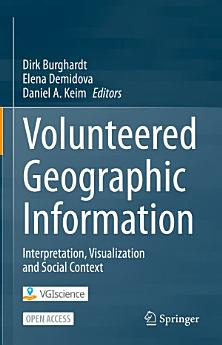Volunteered Geographic Information: Interpretation, Visualization and Social Context
Sobre aquest llibre
The book includes three parts representing the principal research pillars within the program. Part I "Representation and Analysis of VGI" discusses recent approaches to enhance the representation and analysis of VGI. It includes semantic representation of VGI data in knowledge graphs; machine-learning approaches to VGI mining, completion, and enrichment as well as to the improvement of data quality and fitness for purpose. Part II "Geovisualization and User Interactions related to VGI" book explores geovisualizations and user interactions supporting the analysis and presentation of VGI data. When designing these visualizations and user interactions, the specific properties of VGI data, the knowledge and abilities of different target users, and technical viability of solutions need to be considered. Part III "Active Participation, Social Context and Privacy Awareness" of the book addresses the human impact associated with VGI. It includes chapters on the use of wearable sensors worn by volunteers to record their exposure to environmental stressors on their daily journeys, on the collective behavior of people using location-based social media and movement data from football matches, and on the motivation of volunteers who provide important support in information gathering, filtering and analysis of social media in disaster situations.
The book is of interest to researchers and advanced professionals in geoinformation, cartography, visual analytics, data science and machine learning.Sobre l'autor
Dirk Burghardt is Professor of Cartographic Communication at the Institute of Cartography, TU Dresden, Germany, and Vice-President of the German Society of Cartography. He is the coordinator and speaker of the VGIscience priority program funded by the German Research Foundation (2016-2023). His main research interests include geovisual analytics and cartographic communication, automated generalisation and map production, geographic information retrieval and multiscale representations with focus on location-based social media data.
Elena Demidova is Professor of Computer Science and Head of the Data Science and Intelligent Systems Group (DSIS) at the University of Bonn, Germany. Previously, she worked as Research Group Leader at the L3S Research Center, Leibniz University of Hannover, Germany, and as Senior Researcher at the University of Southampton, UK. Her main research interests include data analytics, machine learning, the Web, and Semantic Web technologies.
Daniel A. Keim is Full Professor and Head of the Information Visualization and Data Analysis Research Group in the Computer and Information Science Department of the University of Konstanz, Germany. He has been actively involved in data analysis and information visualization research for more than 25 years and developed a number of novel visual analysis techniques for large data sets. He is a recipient of IEEE VGTC 2011 Visualization Technical Achievement Award, and his work has been recognized through a variety of further awards including best paper and honorable mention awards at the ACM SIGMOD, ACM SIGKDD, and IEEE VAST conferences as well as several awards at the IEEE Visual Analytics Contest.




